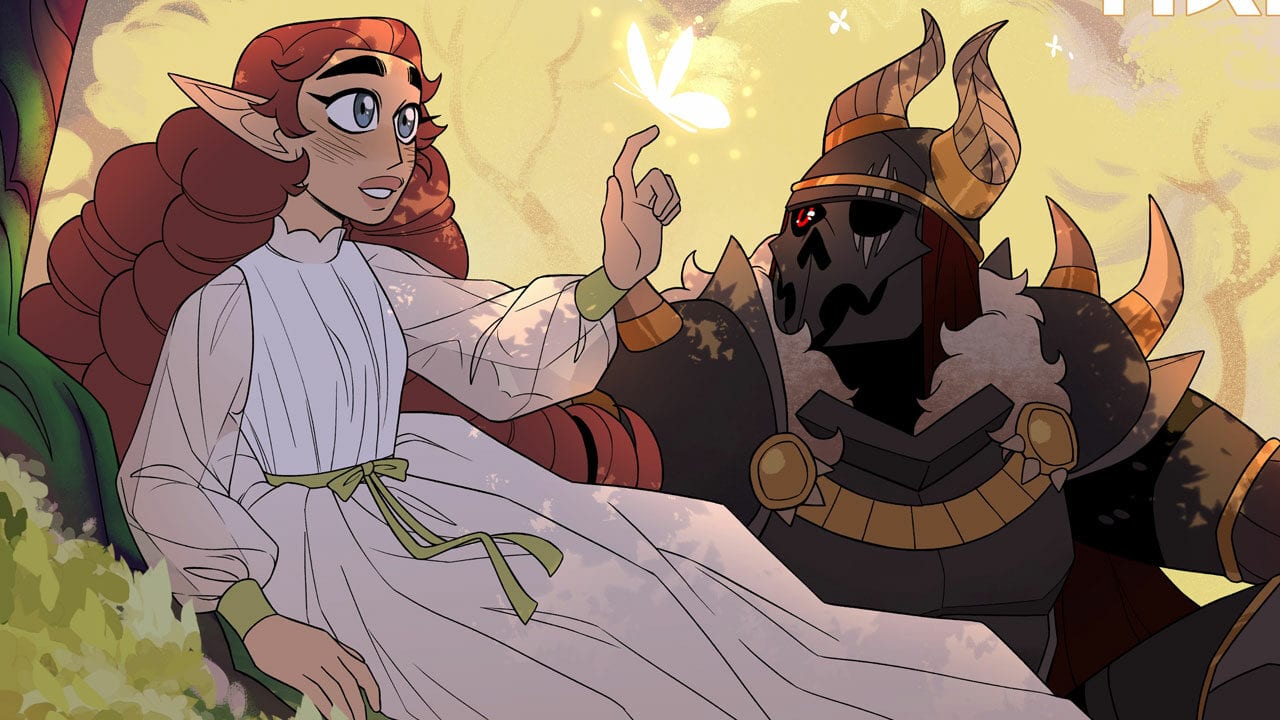Helping Build Content With Webtoon’s David Lee


Web comics have never been bigger, and that is partly because of Webtoon. For those not familiar with the company, Webtoon is a platform that hit the scene back in 2004. Focusing on the world of online comics, the platform allows creators to reach new audiences, giving them the tools they need to achieve their goals. Much like YouTube gave a never before thought platform to a new breed of content creators, Webtoon is doing the same, only in the world of comics and similar media.
Their Webtoon originals have made their way into major networks, with The God of High School and Hellbound being just a few of the series that have been adapted to critical and commercial success. With such a thriving community, and countless series striking big with readers all across the world, CGMagazine reached out to VP Head of content David Lee to talk about the platform.
With it constantly growing and keeping with a creator-first approach, Webtoon has no signs of slowing down, and that is in part due to the people behind the platform, like David, who work tirelessly on programs like the US originals program to shine a light on all the talent on the platform and working to keep growing the platform to make it better for creators and readers alike.

David S. Lee: Webtoon is the largest digital comics’ company in the world. I am sure you’ve seen the numbers that we’ve shared. We have over 82 million readers all around the world. What makes it very unique in comparison to other similar comic mediums is that Webtoon’s key strategy was really going to where the audience is, people on their phones.
We’ve developed a lot of comics that really cater to reading on your mobile, which was sort of key to our growth. That’s really what made Webtoon amazing. Webtoon started in Korea in 2004 and had massive success, partly from 2004 to 2014.
We started noticing that there were a lot of Korean series that were already getting pirated online, and we saw a lot of responses from them. It was very easy to say, “Hey, there might be a market for this”, that’s sort of when we first started. When we first started in the US in 2014, we were looking at the first decade of Webtoon’s growth in the US. The first three years were what I like to call the first quarter when we really focused on creators and laying out the groundwork for setting up an ecosystem.
 Mage & Demon Queen
Mage & Demon Queen
One of the key things that made Webtoon very successful is our open platform, now called Canvas, which operates like YouTube, where creators can just upload their own schedule, and they’ll get to see the audience. This attracted a lot of creators who would naturally work natively to this format. We’ve found a lot of creators during this period to the next transition era, where for the next quarter, we’ve seen a lot of user growth.
This was from 2016 to 2018, based on a lot of creators that we were able to find on Canvas that reported over to us. We’re able to see very strong growth in the user base going from 2019 to 2021. We started monetizing our content based on the model that’s been tested in our Korean counterpart, and we’re able to generate lots of revenue for comic creators. Now we’re entering the final quarter from our perspective with Webtoon US.
Webtoon is a truly massive destination for a lot of people. What do you believe drew so many people into Webtoon? How do you think it can continue to grow year after year?David S. Lee: There’s the accessibility and distribution. There are two key things: one is really catering everything to the mobile format, and two is making lots of episodes freely accessible. Most of our content is free by nature. We have different business models to monetize the engagement, but most readers can access comics for free.
Something that is one of the bigger challenges in the western market is that there’s a bit of a perception bias that people have about comics, that comics are for kids or comics are all superheroes. There’s a bias that people might have, but by making it very accessible, we’ve seen a lot of audiences come to the platform. When we did the survey, a good portion of our audience had never read comics or manga before, and it was their first time experiencing this medium. That’s what made it grow very quickly. The other portion, obviously, is how creator-driven it is.
 Omniscient Reader
Omniscient Reader
Webtoon is giving accessibility not just in distribution but also in making Webtoon more accessible. We start with our open platform. All of our creators come from various backgrounds. Some of them are high school students and college students, and some of them are engineers. Obviously, there are people who used to be graphic designers, people who are teachers, you know, various backgrounds. They can all try this because there’s really no gatekeeping. They can just draw and create the content.
I think that gives a lot of room to be able to be experimental with what they would put out, so it really fosters a creative environment. When we’re putting in a lot of budgets to produce something like a big studio, you have to play it safe to a certain degree because there is an expected audience. But when creators create on Canvas, it’s just an environment that promotes a lot of creativity.
Then we work with these creators and make sure what we’ve been doing is identifying these creators and ensuring that they continue creating. We came up with different business models and different pay structures for these creators to stay motivated so that they could continue to create.
Webtoon has put out some truly loved series, some of them have been turned into Netflix series’. How does it feel as someone that works at a company like that to see the platform of regular people putting these things out there?David S. Lee: It’s extremely gratifying to see, especially the fact that a lot of our creators are finding success. Because when we were first recruiting creators, I think a lot of them had a lot of doubts. People thought this was a scam. Then we started building our credentials by building relationships with the creators.
We only started generating our revenue in 2019, so there were a lot of investment periods where I had to sell creators on our vision. So I think it’s very satisfying to see now that our vision is actually coming true. We have books published in different media adaptations, and I think we’re really only at the beginning of it. There’s so much more to see.
 Suitor Armor
Suitor Armor
David S. Lee: It’s definitely a tough problem to solve for any sort of media service—especially online services—with how easily people can click away from something. I don’t think we’re the only service that has experienced this. Our first core philosophy understands how important it is for this industry to be successful and sustainable. Creators are everything, so we spent a lot of time making sure different titles get their visibility on Canvas early on.
We go through hundreds of thousands of titles. We give it lots of readings to make sure these are seen and get promoted. We also have a superb development team in Korea, who ensures the technology is supported. I guess if I can dial back a little bit on the overall philosophy behind how Webtoon sees its business, it’s really using technology to create the best support in all the media forms that we’re looking at. Whether that’s web novels, webcomics, book publishing or VR games. We’re also coming up with different AI painting tools to help build for the future.
So I think we’re relying heavily on technology to ensure that there’s well-catered visibility. Our app has a lot of personalization features like you would see on Netflix, but there’s also a huge part of curation, where we’re ensuring that the content is visible. I personally read a lot of Canvas titles—this is a bit of a side note, but it’s something that I love sharing. I occasionally go on this binge reading on Canvas where I read 100 titles in one sitting. There’s this big delight that also helps you gain a lot of perspective on being able to look at 10 titles versus 100 titles in an immersive manner. I think it’s something that people would love.
How do you, as a company, view yourself, and how do you think your audience views Webtoon?David S. Lee: We are definitely, as a company, like YouTube and Netflix because we have a very community-driven part. Canvas operates very much like YouTube. I think it also enables a lot of readers to explore and creators to also get inspired. But our original program operates more like Netflix, where it’s more highly curated.
For a lot of projects that we have on originals, we do distribution, production, and development. We also have a lot of different partnerships where we would also license content. So our original pretty much acts as Netflix. We would like our readers to see that Webtoon is just a place for fun and engaging content. For anyone, whether they are into comics or not, this is a place for them to find a really good story for them.
 Lore Olympus
Lore Olympus
David S. Lee: Yeah, absolutely. This is something I could have highlighted earlier. It’s our bread and butter. Our top 10 titles, a lot of them, if not most of them, came from Canvas. So a very important aspect of the business that we found is that creators who are successful, regardless of their experience, are people who have a more innate and native understanding of this format, the medium and the audience. I think Canvas is a perfect place where they can build that experience and also engage with the community, where you also get lots of encouraging feedback from the audience.
So I think it’s almost like a training ground sometimes, and it takes a lot of courage for someone to upload and share their work. We’re very grateful for how supportive this part of the community is. I think it encourages a lot of people to just upload their work and unlock their talent. Most of our success comes from this community, so it’s something that we value greatly.
Thank you so much for your time. You gave some fantastic answers, and I am really excited to see how well Webtoon is doing and how well it continues to do every year.* This article was originally published here


Comments
Post a Comment